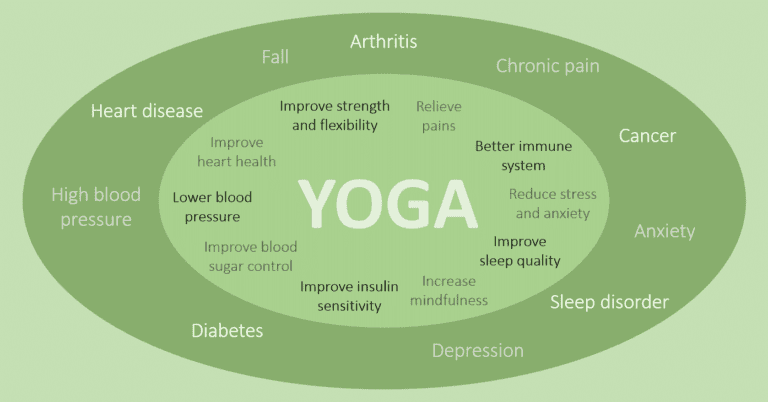Page Contents
In our previous blog article, we have looked at Tai Chi Quan as a recommended exercise for healthy ageing. Today, we will look into another form of slow exercise, yoga.

The practice of yoga continued to evolve over the centuries, with different schools and styles emerging. Today, there are many different styles of yoga, each with its own unique focus and approach. Some of the most popular styles of yoga include Hatha, Vinyasa, Ashtanga, Bikram, and Iyengar.
Yoga trends and statistics
The popularity of yoga has been growing around the world in recent years. According to a 2016 survey conducted by Yoga Journal and Yoga Alliance, there were approximately 36 million yoga practitioners in the United States alone. This represents a significant increase from the 20 million yoga practitioners reported in a similar survey conducted in 2012.
Overall, it is clear that yoga is a popular and growing practice around the world, with millions of people embracing the practice for its numerous health benefits and holistic approach to well-being.
There are many other statistics of yoga trends you can find here.

Yoga and longevity
Yoga can be a helpful practice for promoting longevity and healthy ageing. The teaching of yoga promotes healthy habits, for example, regular physical activity, healthy eating, and stress management, which can contribute to a longer and healthier life.
As you age, your body naturally undergoes changes, such as a decrease in muscle mass and bone density, and an increase in joint stiffness. These changes can lead to a higher risk of falls, fractures, and other physical limitations. Practising yoga can help counteract these changes by improving flexibility, balance, and muscle strength.
Yoga can also be beneficial for mental well-being in older adults by reducing stress, anxiety, and depression. It improves cognitive function and memory, which can be particularly helpful in older age.
Overall, regular yoga practice can have a positive impact on both physical and mental health, and can be a great addition to a healthy lifestyle that promotes longevity. It is important to work with a qualified yoga instructor who can provide modifications and guidance to ensure safety and effectiveness.
Health benefits of learning yoga
Yoga has numerous health benefits for both the body and the mind. The most notable health benefits of practising yoga regularly are described below:
- Improves flexibility
Yoga postures or asanas can help improve flexibility and range of motion in joints, which can reduce the risk of injury and stiffness. - Increases strength
Yoga helps to build strength in muscles throughout the body, including the core, arms, legs, and back. This can improve posture, balance, and overall physical performance and subsequently reduce the risk of falls, injuries, and chronic diseases. - Reduces stress and anxiety
Breathing exercises, meditation, and relaxation techniques in yoga can help reduce stress and anxiety, lower blood pressure, and improve overall mood. - Boosts immune system
Some studies have shown that practising yoga regularly can boost your immune system, which can help prevent illnesses and diseases. - Improves heart health
Practising yoga can help lower blood pressure, reduce cholesterol, and improve heart health. - Promotes better sleep
Yoga can help improve sleep quality and quantity, which can have a positive impact on overall health and well-being. - Relieves pain
Some studies have shown that yoga can help alleviate chronic pain, such as back pain, joint pain, and headaches. - Increases mindfulness
Yoga can help increase mindfulness, which is the ability to be present in the moment and focused on the present experience. This can lead to improved mental clarity, focus, and productivity.
In view of the above health benefits, some evident also shows how yoga can be helpful for managing specific diseases or health conditions:
- Arthritis
Yoga can help improve flexibility, reduce joint pain, and increase mobility in individuals with arthritis. - High blood pressure
Yoga can help lower blood pressure and improve overall heart health. - Diabetes
Yoga can help improve insulin sensitivity, reduce stress, and improve overall blood sugar control. - Cancer
Yoga can help reduce symptoms associated with cancer treatment, such as nausea, fatigue, and anxiety. - Chronic pain
Yoga can help reduce chronic pain, including back pain, neck pain, and joint pain. - Depression and anxiety
Yoga can help reduce symptoms of depression and anxiety, improve mood, and increase feelings of well-being.
Overall, practising yoga regularly can have a positive impact on both your physical and mental health (Figure 1), and can be a great addition to a healthy lifestyle.

Are you too old to learn yoga?
Generally, yoga can be adapted to suit people of all ages and fitness levels. Whether you are a beginner or an advanced practitioner, doing yoga is about knowing your body and its limits. Even though it is never too late to pick up yoga at old age, you should watch out for any potential injuries or hidden conditions.
Many people start practising yoga later in life and find that it is a great way to improve their physical and mental health. Yoga can be particularly beneficial for older adults as it can improve flexibility, strength, balance, blood circulation, and overall mobility.
However, it is important to find a qualified yoga instructor who can provide guidance and support as you learn the practice. They can help you choose appropriate poses and modifications based on your physical abilities and limitations.
If you are a new learner, you should start slowly and gradually build up your practice. This can help prevent injury and ensure that you get the most benefit from the practice. Whether you are young or old, fit or unfit, it is never too late to start practising yoga and experience its many health benefits.
Yoga is not for everyone
While yoga is generally a safe and beneficial for most people, there are some individuals may need to approach the practice with caution or avoid certain types of yoga poses. For example:
- Severe injury or illness
Individuals who are suffering from severe injury or illness should avoid yoga practice. Certain types of yoga poses may need to be modified to prevent further injury or complications. - Joint problems
Individuals with joint problems, such as arthritis, should be caution and selective on choosing the suitable poses, do not perform poses that may place stress on the affected joints. - Pregnancy
While yoga can be a beneficial practice during pregnancy, pregnant women should consult with their doctor and seek out specialised prenatal yoga classes that are tailored to their needs. - Certain medical conditions
Although practising yoga is beneficial to hypertension and heart health, individuals with hypertension, heart disease, and other medical conditions such as vertigo should consult their doctor and instructor on the suitability or choose lighter yoga to prevent further complications. - Recent surgery
For people who have recently undergone surgery (minor or major), they should consult their doctor before starting a yoga practice. Some poses may affect the healing of sutured wounds and cause more damages.
Conclusion
Even though practising yoga has shown beneficial evident on physical and mental health, and there is literally no age limitations in performing the common gentle poses. However, if you are suffering from some health conditions, or unable to do certain challenging poses, it is important to inform your qualified yoga instructor and consult a doctor before practising yoga.
